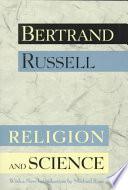Quotes from book
Religion and Science

Examining accounts in which scientific advances clashed with Christian doctrine or biblical interpretations of the day, from Galileo and the Copernican Revolution, to the medical breakthroughs of anesthesia and inoculation, Russell points to the constant upheaval and reevaluation of our systems of belief throughout history. In turn, he identifies where similar debates between modern science and the Church still exist today.

“Not enough evidence God! Not enough evidence!”
As quoted in Wesley C. Salmon's "Religion and Science: A New Look at Hume's Dialogues," Philosophical Studies 33 (1978), p. 176.
Also in the New York Times article So God's Really in the Details? (May 11, 2002) by Emily Eakin: "Asked what he would say if God appeared to him after his death and demanded to know why he had failed to believe, the British philosopher and staunch evidentialist Bertrand Russell replied that he would say, 'Not enough evidence, God! Not enough evidence.'
The original source of this quote is an article by Leo Rosten published in Saturday Review/World (February 23, 1974) which features an interview with Bertrand Russell. There, Rosten writes http://www.unz.org/Pub/SaturdayRev-1974feb23-00025: "Confronted with the Almighty, [Russell] would ask, 'Sir, why did you not give me better evidence?'"
Disputed

Religion and Science (1935), Ch. IX: Science of Ethics.
1930s
Variant: "What science cannot tell us, mankind cannot know." (Attributed to Russell in Ted Peters' Cosmos As Creation: Theology and Science in Consonance [1989], p. 14, with a note that it was "told [to] a BBC audience [earlier this century]").

Religion and Science (1935)
1930s
Context: Why in any case, this glorification of man? How about lions and tigers? They destroy fewer animals or human lives than we do, and they are much more beautiful than we are. How about ants? They manage the Corporate State much better than any Fascist. Would not a world of nightingales and larks and deer be better than our human world of cruelty and injustice and war? The believers in Cosmic Purpose make much of our supposed intelligence, but their writings make one doubt it. If I were granted omnipotence, and millions of years to experiment in, I should not think Man much to boast of as the final result of all my efforts.